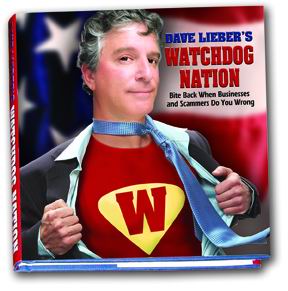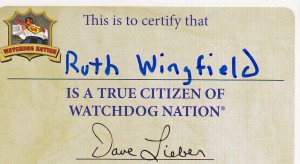Note: Columnist Dave Lieber revisits the story of retired American Airlines captain George Kahak in this 2014 Dallas Morning News column, “A man who fell for, and lost, everything.” After it appeared, readers requested to hear the original audio of Lieber talking to scammer “Inspector Luigi” who pretended to be a U.S. Customs Agent. Watchdog Nation reprints this 2009 post with the sound recordings below.
Ever wonder what a scammer sounds like? Listen to a vulture who preys upon the elderly with a phone call. He wants the 86-year-old man to wire money to a foreign country. But this scam can be stopped when you know how it works. That’s the basis of consumer protection and my Watchdog Nation.
Please let me introduce you to Inspector Luigi. (This next video is an intro, but you can skip to the actual audio files below.)
He is with the U.S. Customs Service — or so this fraud says. He called my pal, George Kahak, who probably holds the world title as victim of the most scams.
I first wrote about George in my Dave Lieber Watchdog column in The Fort Worth Star-Telegram in 2009. The story is so fascinating that I reprinted it in my book — Dave Lieber’s Watchdog Nation.
I’d love for you to read the short chapter on George in this memorable excerpt.
So the other day George called me. He was about to get bit again. He won a half million dollars in a lottery. But the organizers wanted to explain to him how to claim his prize. It involved him sending money to them.
As always, I warned him off. But this time, when Inspector Luigi called George, I was there.
I asked George if I could take the phone. Then I told Inspector Luigi that George is hard of hearing. Meanwhile, I taped it for you.
Please listen to the slick, deep voice of this con artist. He’s a beaut. Each segment is just a few minutes.
In Act I, he explains the scam to me in detail.
Listen here: https://soundcloud.com/davelieber/inspector-luigi-part-i
In Act II, he continues his ridiculous explanation.
https://soundcloud.com/davelieber/inspector-luigi-part-ii
In Act III, well, here’s the real drama. He tells me where to wire the money. Then, The Watchdog confronts him. (This sound file ends when the good inspector hangs up on me.)
https://soundcloud.com/davelieber/inspector-luigi-part-iii
In Act IV, I call back a few days later and Luigi pretends he is some other guy who answers the phone. When he tries to connect me — surprise — I get disconnected.
https://soundcloud.com/davelieber/inspector-luigi-part-iv
And in the finale, Act V, he tries to pretend, once again, that he is someone else. But it’s obviously his voice.
https://soundcloud.com/davelieber/inspector-luigi-part-v
WHY DOES THIS MATTER?
Bastards like Luigi do this every day. There are thousands of them. They prey on your grandmother, your parents, your friends and neighbors. They are so convincing that they get enough victims to make this worthwhile. Luigi is a classic case.
Watchdog Nation can’t stop the Inspector Luigis of the world from operating, but you can expose them and make it clear to all exactly how they operate.
Please share this blog post with those whom you care about.
# # #
Dave Lieber, The Watchdog columnist for The Dallas Morning News, is the founder of Watchdog Nation. His book, Dave Lieber’s Watchdog Nation: Bite Back When Businesses and Scammers Do You Wrong, won two national book awards in 2009 for social change. Please use these icons below to share this warning message on Facebook, Twitter and your other favorite social sites.
– – – – – – – – – – – – – – – – – – – – – – – –
More Watchdog Nation News:
Watchdog Nation Partners with Mike Holmes
America meets Watchdog Nation/Listen to Fun Radio Interview
Watchdog Nation Debuts New e-Book and Multi-CD Audio Book
– – – – – – – – – – – – – – – – – – – – – – – –

Still here? Visit Dave Lieber’s other fun websites:
Personal: YankeeCowboy.com
Hipster site: DaveLieber.org








 \
\















